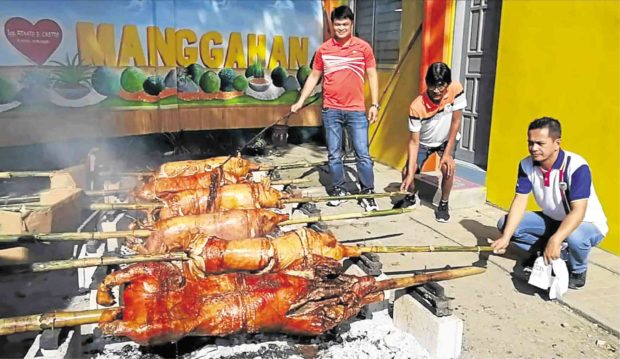Bulacan pork sales drop

FIESTA FARE Residents of Barangay Manggahan in Sta. Maria, Bulacan, prepare roast pigs for a community meal to show support for backyard hog raisers in the town. —CONTRIBUTED PHOTO
STA. MARIA, Bulacan, Philippines — A slump in pork sales prompted a village here to stage a “lechon” feast on Saturday to prove that locally produced meat was safe for human consumption.
Around 500 people feasted on seven roasted pigs in Barangay Manggahan, where many residents operate backyard pig farms. They also partook of other pork meals such menudo and adobo.
Renato Castro, Manggahan village chair, initiated the event, hoping to change assumptions that hogs affected by the African swine fever could also infect people.
Checkpoints
While this town has not recorded any instances of swine fever in its pig farms, it has set up checkpoints to prevent the entry of infected hogs from other provinces, according to Councilor Ynah Castro.
Article continues after this advertisementIn the City of Malolos, the local meat association also planned to stage its own lechon feast this week to convince people to buy and eat pork.
Article continues after this advertisementThe Malolos market usually slaughters 80 to 100 pigs a day because of the demand, which can increase to 120 to 150 hogs during weekend.
Backyard raisers
But the number had gone down to 20 to 40 pigs the last few weeks due to poor sales, said Laura Cuyugan, a meat stall owner.
“Last week, only six pigs were slaughtered at the Malolos market. Some vendors stopped displaying pork meat,” she said.
Marilou Cruz, another meat stall owner, said pork sales had dipped since August. She gets her supplies from commercial farms in San Miguel town, also in Bulacan.
Cruz said backyard raisers helped keep prices stable. “Backyard raisers charge a little less than commercial pig farms,” she said.
At the Bulakan town public market, Mario Garcia, a meat vendor, said a kilo of pork sold for P200 despite the low sales last week.
“This Sunday, we sold meat from two pigs in half a day unlike last week when we barely sold pork in a day. We used to slaughter four pigs a day and seven pigs during weekend because of the demand,” he said.
Pangasinan ban
In Pangasinan, workers in Mapandan burned and buried 71 hogs, including 60 allegedly smuggled into the province from Bulacan despite a ban on pork shipment from other provinces.
The provincial government said it would charge hog traders defying the ban. The pigs were reportedly brought in to Mapandan from San Manuel town in Tarlac province.
On Saturday, Pangasinan Gov. Amado Espino III said five pigs that were also destroyed and buried in Calasiao town were found to be free from swine fever. —Carmela Reyes-Estropez and Yolanda Sotelo